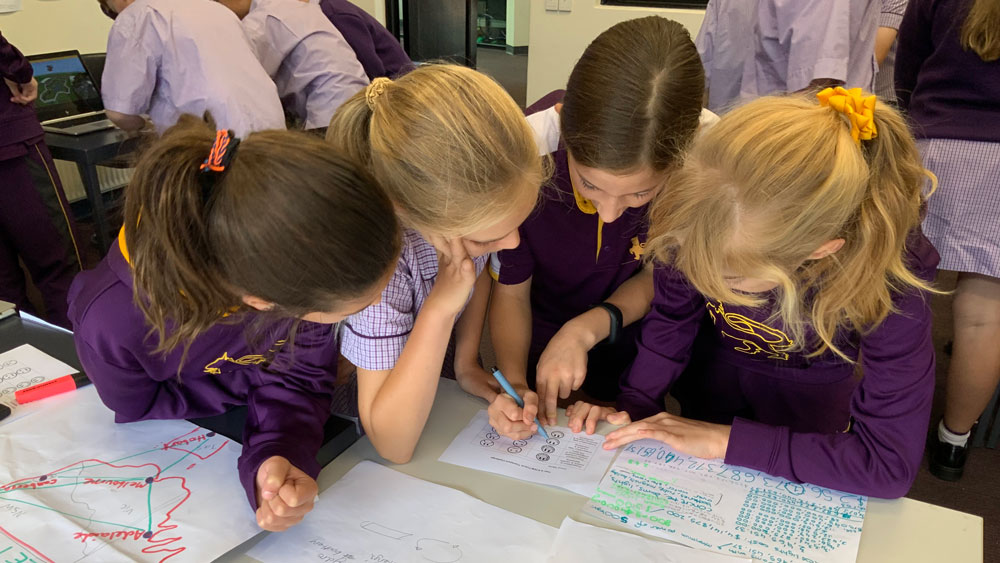
Students in Year 8 researched, tested and presented their concepts for a future transport system, and developed the skills needed to survive and thrive in times of change, as Rob Gow reports.
In our increasingly technology-driven world, our students’ ability to combine science, technology, engineering and maths – or STEM – knowledge and skills and soft skills like complex problem solving, critical thinking, creativity and collaboration has never been more important. STEM education is critically important for our current and future productivity, and we need to engage students in real-life, practical scenarios and decision making that involve STEM if they are to develop the skills needed as technology expands into every aspect of life and work.
STEM and interdisciplinary learning
One of the ways we’re enabling our students to develop their STEM and soft skills is through interdisciplinary investigations enabled through the International Baccalaureate Primary Years Program (PYP) and Middle Years Program (MYP). As David Edwards, Head of Campus at St Kilda Road, notes in ‘The importance of STEM at Wesley College,’ the inter-related STEM disciplines are well suited to such an interdisciplinary approach.
The rich framework of both the PYP and MYP stimulates our students not only as problem solvers but also as problem posers. A great example of our interdisciplinary approach through the MYP is the ‘Future Transport STEM Challenge,’ a learning challenge our Year 8 students readily accepted to investigate new modes of transport to make our city more liveable and sustainable into the future.
The brief for the Year 8s was to investigate, design and present a new transport system to move 300,000 patrons to and from the Melbourne Formula One Grand Prix over a four-day period. The challenge was set in the future and students worked creatively and collaboratively in teams of four to research, problem-solve, prototype, evaluate and develop their final concept proposal for a future transport system.
Throughout Term 1, the Year 8 students worked collaboratively across their humanities, mathematics and science classes to develop and refine their research, prototyping and evaluation skills.
The entire Year 8 cohort and staff attended the Melbourne Formula One Grand Prix in March to seek inspiration. Using the knowledge and skills they learned in class and at the race track, they delivered outstanding presentations to staff and our Year 5/6 students. The presentations were appraised by their peers, who gave useful feedback on the high quality and diverse range of concept proposals.
Proposals included long-haul and short-haul electromagnetic-levitation train-like vehicles, solar-powered flying pods and ski-lift transportation, with some groups proposing the use of tunnels and others leveraging existing infrastructure, such as airports and train stations.
According to Year 8 student Erin Rahilly, visiting the Grand Prix at Albert Park to experience transport concepts, simulators and robotic engines provided plenty of inspiration.
‘After several weeks of hard work, my group along with everyone else produced a design to present to the Year 5/6s. For my group, this included a poster and PowerPoint presentation describing our idea and how it worked, and some sketches to demonstrate what it looked like.
‘The best thing about the Future Transport STEM Challenge was how everyone had a different perspective,’ Erin said. ‘Some groups adapted current modes of transport, while others had completely new concepts.
‘This project was fun. I would definitely recommend it to others coming through Year 8.’
Why STEM?
STEM learning empowers individuals with the skills to succeed in our rapidly changing world. Employer demand for STEM qualifications and skills is high and will continue to increase in the future. Currently, 75 per cent of jobs in the fastest growing industries require workers with STEM skills. To be competitive in the global workforce, our students will need STEM capabilities, but also the ability to adapt to a changing workplace.
This is because the job market is also changing, and future career paths will involve even more change and less predictability. As a result, workers in the future will need to be more adaptable. It is predicted that when today’s 13-year-olds begin their career, they will have to navigate at least 17 job changes across five different careers. And those 17 jobs will be more fluid, involving working across many types of projects and portfolios, and using multiple skills.
To prepare for this future, our students need to develop the entrepreneurial skills and mindset to manage a portfolio career. Alongside STEM knowledge and skills, they need the soft skills to be effective problem solvers, communicators and collaborators.
The solutions our Year 8s proposed to the Future Transport STEM Challenge suggest they are developing the skills they’ll need to survive and thrive in our changing world.
Rob Gow is Head of Middle School at Wesley’s St Kilda Road Campus.
